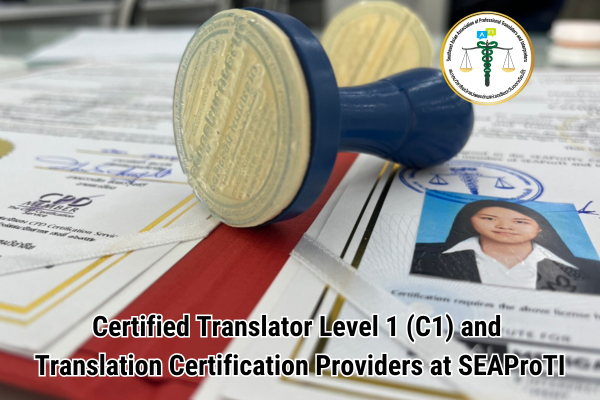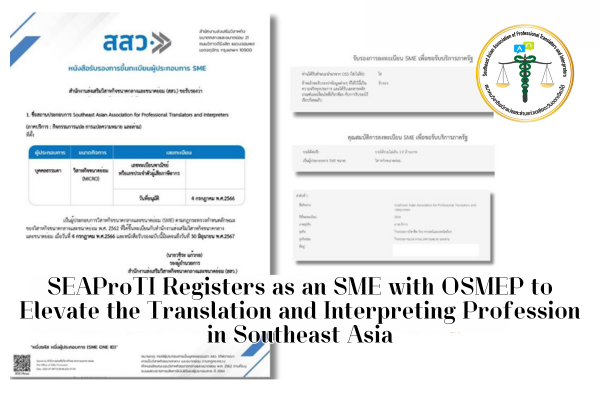Closing a Business Properly in Thailand
16 January 2025, Bangkok – Starting and running a business in Thailand as a foreign national can be a challenging process. Navigating through government procedures, managing utilities, and hiring employees in a competitive labor market requires careful attention to detail and adherence to local regulations. When the time comes to close a business, this process becomes even more complex and legally intricate.
Properly closing a business involves several steps that must be followed to ensure all legal obligations are met. While SEAProTI plays a helpful role in facilitating communication and document management, the closure process itself is comprehensive and requires careful execution.
Steps to Properly Close a Business in Thailand
Filing for Dissolution with the Department of Business Development
The first step in closing a business is filing for dissolution with the Department of Business Development. This process involves submitting necessary documentation and working with government officials to officially end the company’s operations.
Managing Company Assets
If the company is solvent, liquidating assets is necessary to return funds to shareholders. If the company is insolvent, shareholders may inject additional capital, or a liquidator must begin bankruptcy proceedings to clear outstanding debts.
Filing Tax Returns and Settling Tax Liabilities
All tax obligations must be met before closing the business. Bankruptcy does not discharge tax debts, so filing tax returns and settling liabilities is crucial for a smooth closure.
Employee Payments and Severance
Employees should be paid their salaries and any severance benefits owed. For foreign employees, work permits must be returned to the Ministry of Labor within seven days of employment cessation.
Notifying Suppliers and Customers
Suppliers and customers must be legally notified of the termination of business operations, and arrangements should be made to end any existing contracts.
Closing Bank Accounts and Financial Settlements
All financial accounts must be closed and settled to ensure no further liabilities remain.
Notifying the Landlord and Terminating Lease Agreements
The landlord must be notified, and the lease must be properly terminated to finalize the business closure.
SEAProTI’s Role in Business Closure
SEAProTI—the Southeast Asia Association of Professional Translators and Interpreters—plays a valuable role in supporting business owners during the closure process. Their certified translators and interpreters assist in several key areas:
-
Legal Documentation
SEAProTI members ensure that all legal documents, such as contracts, tax filings, and financial statements, are accurately translated to avoid misunderstandings and ensure compliance with Thai regulations. -
Facilitating Communication with Authorities
SEAProTI helps bridge the language gap when communicating with Thai government agencies, ensuring that all interactions are smooth and accurate. -
Handling Employee-Related Matters
For foreign employees, SEAProTI ensures that work permits are properly returned to the Ministry of Labor and assists in managing severance payments and other employee-related requirements. -
Terminating Contracts
SEAProTI provides professional translations and communication support to terminate contracts with suppliers, customers, and landlords effectively.
In conclusion, while SEAProTI is not solely responsible for the entire business closure process, their expertise in legal translation and interpretation ensures that businesses meet their obligations accurately and efficiently. Their involvement helps reduce risks and ensures a smoother transition during business shutdowns.
About SEAProTI’s certified translators, translation certification providers, and certified interpreters:
The Southeast Asian Association of Professional Translators and Interpreters (SEAProTI) has officially announced the criteria and qualifications for individuals to register as “Certified Translators,” “Translation Certification Providers,” and “Certified Interpreters” under the association’s regulations. These guidelines are detailed in Sections 9 and 10 of the Royal Thai Government Gazette, issued by the Secretariat of the Cabinet under the Office of the Prime Minister of the Kingdom of Thailand, dated July 25, 2024, Volume 141, Part 66 Ng, Page 100.
To read the full publication, visit: the Royal Thai Government Gazette
การปิดกิจการอย่างถูกต้องในประเทศไทย
16 มกราคม 2568, กรุงเทพมหานคร – การเริ่มต้นและดำเนินธุรกิจในประเทศไทยสำหรับชาวต่างชาติอาจเป็นเรื่องที่ท้าทาย กระบวนการตั้งบริษัท การจัดการบริการต่าง ๆ และการจ้างพนักงานต้องดำเนินการผ่านแบบฟอร์มที่ต้องยื่นกับหน่วยงานรัฐ รวมถึงปัญหาต่าง ๆ เช่น การขาดแคลนแรงงานและข้อขัดแย้งทางวัฒนธรรมที่อาจนำไปสู่ความไม่เข้าใจระหว่างลูกค้าและพนักงาน นอกจากนี้ การบังคับใช้สัญญาและการรับมือกับกระบวนการทางธุรกรรมในภาษาที่ไม่คุ้นเคยยังเป็นเรื่องที่ยุ่งยาก
เมื่อธุรกิจไม่สามารถดำเนินต่อไปได้ อาจถึงเวลาที่ต้องปิดกิจการ กระบวนการปิดกิจการอย่างถูกต้องในประเทศไทยมีหลายขั้นตอนที่ต้องทำให้ครบถ้วน เพื่อหลีกเลี่ยงปัญหาทางกฎหมายในอนาคต
ขั้นตอนการปิดกิจการในประเทศไทย
การยื่นคำขอเลิกกิจการกับกรมพัฒนาธุรกิจการค้า
ขั้นตอนแรกในการปิดกิจการคือการยื่นคำขอเลิกกิจการกับกรมพัฒนาธุรกิจการค้า โดยต้องเตรียมเอกสารที่จำเป็นและดำเนินการร่วมกับเจ้าหน้าที่ของรัฐ เพื่อให้การปิดกิจการเป็นไปตามกฎหมาย
การบริหารทรัพย์สินของบริษัท
หากบริษัทมีฐานะทางการเงินดี สามารถดำเนินการขายทรัพย์สินเพื่อนำเงินคืนให้กับผู้ถือหุ้นได้ แต่หากบริษัทอยู่ในภาวะล้มละลาย ผู้ถือหุ้นอาจต้องเพิ่มเงินทุน หรือผู้ทำหน้าที่ล้มละลายจะต้องดำเนินการตามขั้นตอนกฎหมายเพื่อล้างหนี้สิน
การยื่นภาษีและชำระหนี้สินทางภาษี
การยื่นภาษีและชำระภาษีเป็นสิ่งที่ต้องทำให้ครบถ้วนก่อนการปิดกิจการ เนื่องจากการล้มละลายไม่สามารถลดหนี้ภาษีได้ ดังนั้นการจัดการด้านภาษีอย่างถูกต้องจึงมีความสำคัญมาก
การจ่ายเงินเดือนและค่าชดเชย
พนักงานต้องได้รับเงินเดือนและค่าชดเชยที่ค้างจ่าย นอกจากนี้ หากมีพนักงานต่างชาติ จะต้องส่งคืนใบอนุญาตทำงานให้กับกระทรวงแรงงานภายในเจ็ดวันหลังจากที่สิ้นสุดการจ้างงาน
การแจ้งผู้ให้บริการและลูกค้า
ผู้ให้บริการและลูกค้าต้องได้รับการแจ้งล่วงหน้าอย่างเป็นทางการเกี่ยวกับการสิ้นสุดการดำเนินธุรกิจ และต้องจัดการสัญญาที่มีอยู่ให้ถูกต้อง
การปิดบัญชีธนาคารและการตั้งถิ่นฐานทางการเงิน
การปิดบัญชีและจัดการการตั้งถิ่นฐานทางการเงินทั้งหมดเป็นสิ่งที่ต้องทำ เพื่อหลีกเลี่ยงการมีภาระหนี้สินที่ยังไม่ได้รับการชำระ
การแจ้งยุติสัญญาเช่าและการสิ้นสุดสัญญาเช่า
เจ้าของอาคารหรือผู้ให้เช่าจะต้องได้รับการแจ้งให้ทราบเกี่ยวกับการสิ้นสุดธุรกิจและต้องยุติสัญญาเช่าอย่างถูกต้อง
SEAProTI มีบทบาทอย่างไรในเรื่องนี้
SEAProTI—สมาคมวิชาชีพนักแปลและล่ามแห่งเอเชียตะวันออกเฉียงใต้—มีบทบาทสำคัญในการช่วยให้ธุรกิจสามารถปิดกิจการได้อย่างราบรื่นและถูกต้องตามกฎหมาย ด้วยสมาชิกที่เป็นนักแปลและล่ามมืออาชีพ SEAProTI ให้บริการในการแปลเอกสารที่เกี่ยวข้อง เช่น สัญญา เอกสารทางการเงิน และการยื่นภาษี เพื่อหลีกเลี่ยงข้อผิดพลาดที่อาจนำไปสู่ปัญหาทางกฎหมาย นอกจากนี้ SEAProTI ยังช่วยในเรื่องการสื่อสารกับหน่วยงานราชการ โดยเฉพาะเมื่อมีข้อจำกัดด้านภาษา ซึ่งเป็นสิ่งสำคัญในการปิดกิจการที่มีประสิทธิภาพ
ในท้ายที่สุด SEAProTI ช่วยลดความเสี่ยงด้านกฎหมายและข้อพิพาทที่อาจเกิดขึ้นหลังจากการปิดกิจการ ทำให้เจ้าของธุรกิจสามารถปิดกิจการได้อย่างมั่นใจและถูกต้องตามหลักเกณฑ์ที่กำหนดไว้
เกี่ยวกับนักแปลรับรอง ผู้รับรองการแปล และล่ามรับรองของสมาคมวิชาชีพนักแปลและล่ามแห่งเอเชียตะวันออกเฉียงใต้
สมาคมวิชาชีพนักแปลและล่ามแห่งเอเชียตะวันออกเฉียงใต้ (SEAProTI) ได้ประกาศหลักเกณฑ์และคุณสมบัติผู้ที่ขึ้นทะเบียนเป็น “นักแปลรับรอง (Certified Translators) และผู้รับรองการแปล (Translation Certification Providers) และล่ามรับรอง (Certified Interpreters)” ของสมาคม หมวดที่ 9 และหมวดที่ 10 ในราชกิจจานุเบกษา ของสำนักเลขาธิการคณะรัฐมนตรี ในสำนักนายกรัฐมนตรี แห่งราชอาณาจักรไทย ลงวันที่ 25 ก.ค. 2567 เล่มที่ 141 ตอนที่ 66 ง หน้า 100 อ่านฉบับเต็มได้ที่: นักแปลรับรอง ผู้รับรองการแปล และล่ามรับรอง
























